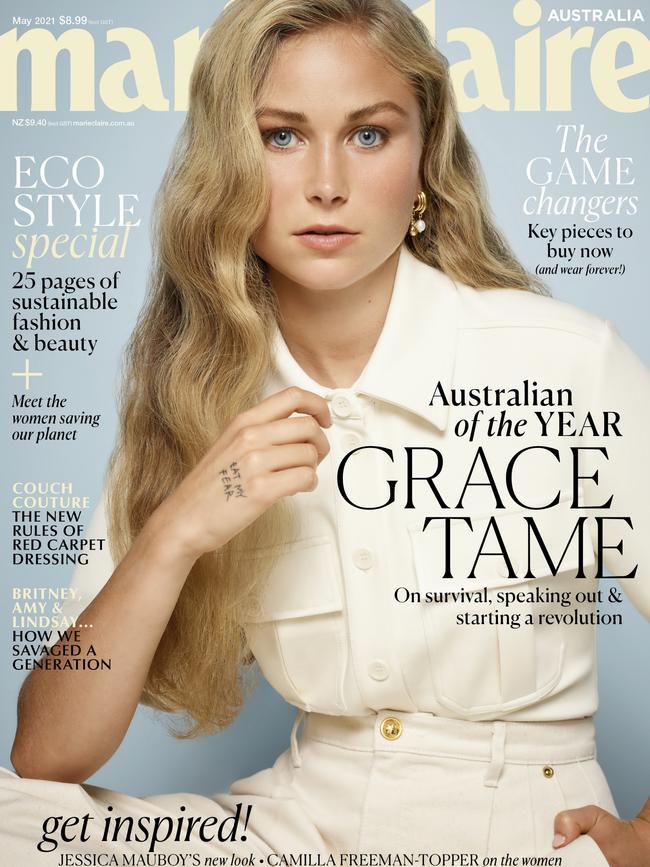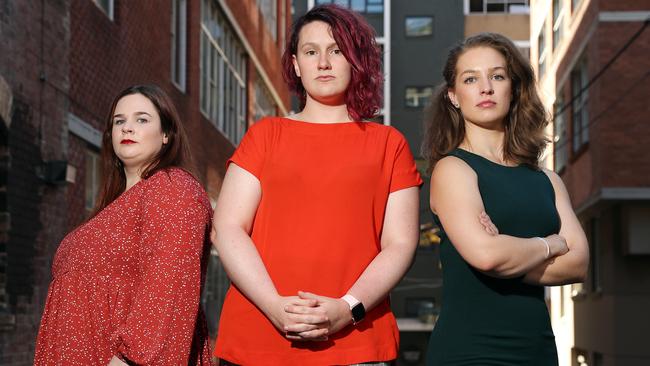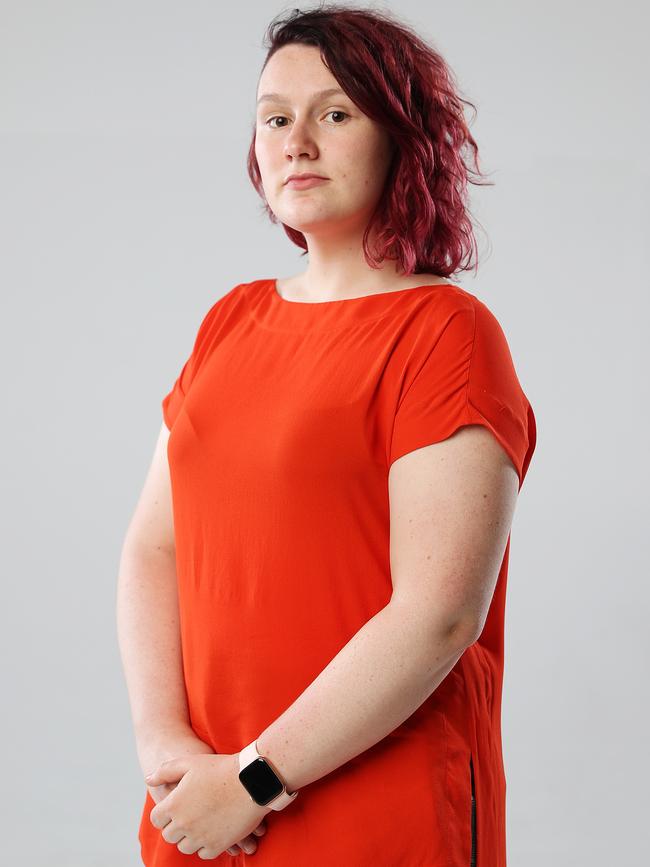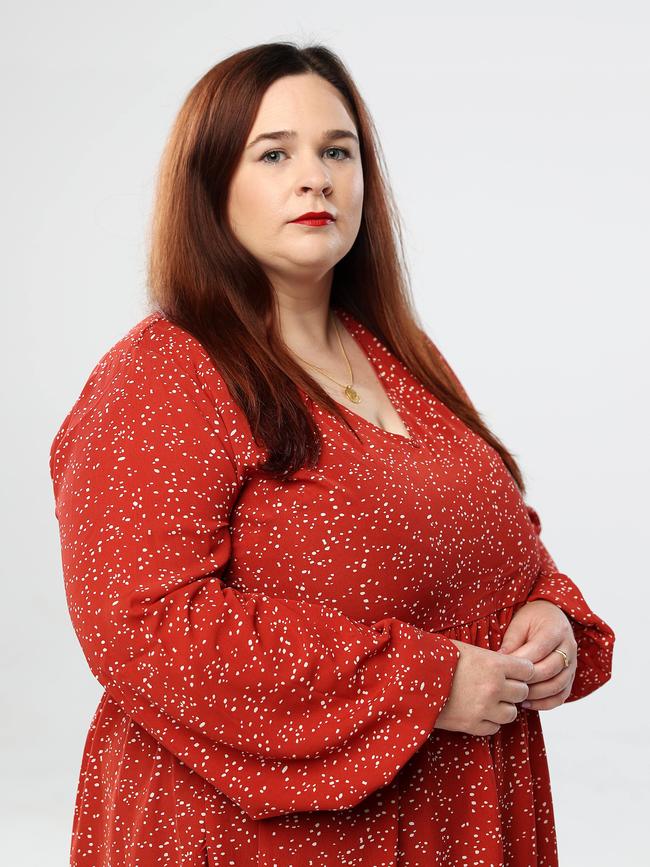Why NSW consent laws aren’t working and how we can fix them
Child sex abuse survivor and Australian of the Year Grace Tame has added her voice to calls for sexual violence law reform. Our newly-launched campaign is asking for real change in the way the legal system deals with sex crimes.
Police & Courts
Don't miss out on the headlines from Police & Courts. Followed categories will be added to My News.
Grace Tame has added her voice to the calls for sexual violence law reform.
The Saturday and Sunday Telegraphs have launched a campaign — in partnership with Rape And Sexual Assault Research and Advocacy — calling for consent law reform, specialised sexual assault courts and an audit of relationship and sexuality education in NSW schools.
“I definitely support this; anything that’s in the interest of progress of this issue is important,” Ms Tame said on Saturday.
“In terms of legislation across the nation, we have eight different jurisdictions and eight different definitions of consent.
“It’s the fact there are eight of them and having eight of them for a concept as absolutely critical as consent underestimates our ability to understand and take it seriously.”


Ms Tame has also advocated for modernised education initiatives that include teaching young people about the signs of grooming.
“When we start to understand the complexities of this calculated manipulation we can start to answer the questions of why don’t you just say no or what didn’t you tell anyone,” she said.
Ms Tame, whose home state of Tasmania already has an affirmative consent model, also said there needed to be less interrogation of already traumatised survivors.
The 2021 Australian of the Year is dedicating her life to help other survivors of sexual abuse.
Tame, 26, rose to national prominence as a child sex abuse survivor, who contributed to the #LetHerSpeak campaign that overturned controversial “victim gag orders” in Tasmania and the Northern Territory.
“For me it is a no-brainer … it’s terrifying to do something in the face of evil, but what’s more terrifying is not doing something,” Tame told the latest issue of Marie Claire magazine, which is released on Thursday.
“There’s so much more potential suffering to come from doing nothing. I won’t stop until I see the end of child sexual assault; it’s as simple as that.”
But Tame, who is in a happy relationship with her boyfriend Max, said she doesn’t want men to be seen as the enemy and has no interest in being a poster girl for rage and anger.
A MATTER OF CONSENT: THREE WAYS TO JOIN OUR CAMPAIGN
Sexual assault is the most under-reported crime type in Australia and notoriously difficult to prosecute.
The evidentiary gems that can make or break a murder or a robbery case — CCTV, eyewitness accounts and weapons — are hard to come by in sexual assault investigations.
The court process is often gruelling and lengthy.
Victims have to relive their assault in minute detail in court, and withstand brutal cross-examination that questions their credibility and motive in front of 12 strangers judging them from the jury box.

Experts say that process deters many victims from coming forward to police in the first place. Of those that do, many of their complaints don’t make it past police and to court anyway.
Only 3 per cent of sexual assault incidents reported to NSW Police in 2018-2019 resulted in guilty outcomes, the NSW Law Reform Commission found.
But there are simple steps that can turn this horrifying statistic around.
In partnership with the Rape And Sexual Assault Advocacy and Research initiative (RASARA), we are fighting to make these changes happen and we are calling on you to help.
First, call your local MP and demand they support these changes.
Second, write to us and tell us your stories: carrollm@sundaytelegraph.com.au or ava.benny-morrison@news.com.au
STEP ONE: LEGISLATE AFFIRMATIVE CONSENT
Most of these cases come down to the issue of consent — a simple word with an incredibly complex legal meaning.
To prove beyond reasonable doubt that a rape occurred, the prosecution must prove that a victim did not consent to sexual activity and that the offender knew or did not have reasonable grounds to know there was no consent.
The focus then rests on what the victim did or didn’t do to show their non-consent.
Did she say no? How did her body respond when the sex act started? What did she do to make the man think she was consenting?
An offender only needs to show that they had an honest and reasonable belief that the victim was consenting, even if she wasn’t.
This is where many cases come unstuck.
We are pushing for an amendment to the legal definition of consent under section 61HE of the Crimes Act to reflect an affirmative consent model.
That means a person does not consent if the person does not say or do anything to communicate consent.
This reform has been recommended by the NSW Law Commission.
However, we don’t believe this goes far enough.
We are asking the state government to legislate that a person must show what active and reasonable steps they took to obtain consent if they want to rely on the honest and reasonable belief defence.
This reflects a standard that consent should be asked for, communicated and ongoing.
It can be as simple as asking: ‘Is this OK?’ or ‘Do you want to go further?’
Without mandating reasonable steps, NSW will not have affirmative consent, criminology lecturer Dr Rachael Burgin said.
“It shifts the focus from the victim’s actions onto the actions of the accused,” the Rape And Sexual Assault Research and Advocacy (RASARA) chair said.
“That's the real tension. If it’s properly legislated it will protect people who genuinely have a reasonable belief and shouldn’t be captured by criminal law and protect survivors.
“As it stands, the law protects the perpetrators who do nothing to make sure they have consent.”
This affirmative consent model is already law in Tasmania and Canada.
STEP TWO: A PILOT PROGRAM OF SPECIALIST SEXUAL ASSAULT COURTS
Sexual assault survivors have likened the process of going through the criminal justice system to a trauma on par with the rape.
The environment is unfamiliar and, while the defendant has a lawyer and the state has a lawyer, the victim must navigate the system on their own.
And because sexual assault cases often come down to one person’s word against another’s, a heavy burden is placed on the victim’s evidence.

The cross-examination of a victim can be brutal, invasive and unforgiving.
We are asking the government to commit to a pilot program of specialist sexual assault courts in NSW.
Similar to the child sexual assault pilot announced in 2015, the specialist judges who have undergone judicial education on sexual violence and its complexities should be appointed to oversee the courts.
There will also be a focus on how survivors are familiarised with the court process and how they give evidence without extreme retraumatisation.
Survivor Saxon Mullins navigated two criminal trials in a highly-publicised rape matter against Luke Lazarus.
Ms Mullins, now a leading advocate for consent law reform, was sexually assaulted in an alleyway behind a Kings Cross nightclub in 2013.
After two trials and two appeals, Lazarus walked free in a controversial decision that triggered a review of NSW’s consent laws.
Ms Mullins said specialist sexual assault courts that accommodated for victims with witness rooms, routes in and out of court that won’t cross with the defendant, and giving evidence via video-link could be really important.
“When we talk about sexual violence cases being heard, a lot of experiences are really bad and some are not,” the RASARA director said.
“It should not be a spinning wheel of whether you get a good DPP case officer or if counsel does the right thing. It should not be up for discussion.”
In her case, prosecutors advised Ms Mullins against giving evidence by video-link — so complainants don’t have to sit in the courtroom with defendants and their supporters — because it was less powerful in front of the jury.

“This is why we say we need trauma-informed people working in these institutions,” she said.
“They were concerned about winning this case and not about what circumstances I was giving evidence in.”
Rape and Domestic Violence Services Australia, which with Women’s Safety NSW and Community Legal Centres NSW supports specialist courts, says it should also involve specialist prosecutors, a streamlined process that will result in less re-traumatisation and delays and representation for victims.
The child sexual assault courts also allowed children to prerecord their evidence, including cross-examination, in the absence of a jury.
Witness intermediaries were also introduced to assist child victims in giving their evidence and making sense of questions from lawyers and judges.
Specialist sexual violence courts have been trialled and widely applauded in New Zealand since 2016.
An evaluation found a pilot program of the courts significantly reduced the time victims and defendants had to wait for trial.
STEP 3: RELATIONSHIP AND SEX EDUCATION TRAINING FOR TEACHERS AND AN AUDIT OF HOW CONSENT EDUCATION IS TAUGHT IN ALL SCHOOLS
Ever since a petition calling for better sex education sparked a flood of horrific disclosures about rape and unwanted sex from private school students in Sydney, the national conversation has been focused on consent education.
The national curriculum provides guidance for what Australian students should be taught, including about respectful relationships.

It is up to states to drill down on the detail and then up to individual schools how much weight they give the subject as well as the delivery.
In NSW, the revised physical education syllabus, which became compulsory last year, mentions the word “consent” eight times.
However, experts point out that consent is only one part of relationship and sexuality education.
Depending on which school you go to, the relationship and sexuality education focus will vary greatly.
For example, one high school may teach one or two lessons on risk aversion, with topics such as pregnancy, contraception and anatomy.
But another high school may bring in relationships and sexuality education experts to run comprehensive workshops and seminars.
Experts warn the approach in NSW is ad hoc and inconsistent, and the topic isn’t valued highly enough or taught early enough.
“The moment students enter formal education environment, they should be getting some kind of RSE (Relationship and Sex Education) that’s age-appropriate,” criminal lawyer and RASARA primary prevention researcher Katrina Marson said.
“We are mistaken if we think people hit the age of consent and the skills they need to navigate consent and respectful relationships spontaneously manifest.”
Parents needed to be involved in the RSE conversation too, Ms Marson said, the programs needed to be evaluated regularly.
As a foundation, the campaign is calling for the NSW Education Standards Authority (NESA) to carry out a statewide of audit of exactly how schools, including independent, public and Catholic, are delivering relationship and sexuality education properly.
More Coverage
Read related topics:NSW consent laws





